Details on the pending Türkiye-Syria maritime agreement
 File photo showcases Mersin Port, one of Türkiye's busiest ports, located in the Mediterranean region. (IHA Photo)
File photo showcases Mersin Port, one of Türkiye's busiest ports, located in the Mediterranean region. (IHA Photo)
Türkiye is preparing for a maritime jurisdiction agreement with the new administration in Syria, as confirmed by Turkish Transportation and Infrastructure Minister Abdulkadir Uraloglu on Tuesday.
Following the collapse of Bashar al-Assad and the Baath regime in Syria on Dec. 8 by the Syrian oppositional forces, a transitionary government was swiftly established by the main opposition Hayat Tahrir al-Sham (HTS). The transitionary government will stay in power in Damascus until March 2025 to ensure peace and stability following 13 years of civil war.
Türkiye has been a committed actor in the Syrian theater, providing security to roughly a third of the Syrian population as the conflict unfolded. Now Ankara’s top officials are becoming the first to visit a liberated Syria and promising commitments to rebuild the nation.

Out of a multitude of agreements set to take place, Türkiye and Syria also have a potential maritime jurisdiction agreement down the pipeline. Both nations have never been able to achieve such an agreement previously.
Legal standing of maritime agreement
Yucel Acer, an expert on international maritime law and working at the Foundation for Political, Economic and Social Research (SETA) in Ankara, commented to Türkiye Today, “International law does not accept any unilateral deliberations of borders. International law requires bilateral consensus, whether it be territorial waters, exclusive economic zone (EEZ) or continental shelf. The move needs a bilateral Türkiye-Syria agreement.”
Speaking regarding the current situation, “No maritime delineation agreement took place with the Assad regime, with the change of leadership in the country, given the positive attitude it maintains toward Türkiye and relations do not decline, then the comments of Minister Uraloglu stand. Yet Uraloglu mentioned an agreement moving forward, not completely right now.”
In terms of how an agreement would materialize, Acer stated that Türkiye and Syria would most probably pursue a partial maritime bilateral agreement, as there is the Turkish Republic of Northern Cyprus (TRNC). A trilateral agreement between Türkiye, the TRNC, and Syria would be required to completely delineate the waters in the discussion.
Acer highlighted that Türkiye and TRNC already maintain a standing bilateral continental shelf agreement between themselves dated back to 2011. “The problem is that the temporary government in Syria would have to recognize the TRNC for the (trilateral) agreement to be valid.”
Greece and Southern Cyprus have been tense regarding the matter, as they view Cyprus as a single political entity, neglecting the realities on the ground. Acer explained, “They (Greece) are already preparing to get the EU to put pressure on Türkiye against the maritime jurisdiction agreement.”
“At the current moment, without involving the TRNC, a smaller maritime jurisdiction agreement can be made between Türkiye and Syria.”

More agreements pending with Syria
Omer Ozkizilcik, an expert on the region and a non-residential fellow at the Atlantic Council, spoke to Türkiye Today, “The expectation is that more agreements between Türkiye and Syria will arise. Maritime delineation is only one part of this. There will also be air, land, economic, and military agreements. There are also agreements that can be made in energy, potential pipeline work and hydrocarbon search and extraction.”
“Syria currently lacks the capacity but would want to search for and benefit from its natural resources. Deposits of natural gas have been found off the shores of Egypt, Israel and Lebanon; Syria will likewise want to know if there are hydrocarbons off its shores.”
As for the potential regional impact of a Türkiye-Syria maritime agreement, Ozkizilcik highlighted, “The maritime agreement, especially for the Eastern Mediterranean, will render the legal framework and balance of power of Greece’s maximalist claims to be no longer sustainable.”
Ozkizilcik drew attention to what matters now: “These are all secondary issues. The primary concern at the moment for Türkiye and Syria is for the new government to be successfully established in Damascus, after which lasting stability can be established for Syria. We can expect Türkiye to move together with regional and global actors.”



